Is it possible to be both hyperthyroid and hypothyroid at the same time?
The short answer is no.
It is not possible for the same cell or the same tissue in your body to be both hyperthyroid and hypothyroid at the same time.
Does that mean that you cannot have both hyperthyroid and hypothyroidism symptoms simultaneously?
No, that is very possible and I will explain why later in this article.
But for now, we need to have a discussion on thyroid hormone status.
The reason that a single cell or tissue cannot be both hyperthyroid and hypothyroid at the same time has to do with how thyroid hormone impacts your cells.
Each cell has a receptor for thyroid hormone, usually located in the nucleus of the cell (1), which must be turned on.
This nuclear receptor, when activated, turns on genetic transcription and results in changes to the enzymes and proteins produced by the cell.
These enzymes then leave the cell and have the desired effect that you are looking for such as increasing your metabolism, helping your hair follicles grow, balancing your mood, and so on.
What you need to understand is that this system can either be turned on or not.
It can either be stimulated or not.
But what it cannot be is both stimulated and not stimulated at the same time which means you can’t be both hyperthyroid and hypothyroid in the same tissue at the same time.
Why then do certain individuals experience symptoms consistent with hyperthyroidism and symptoms consistent with hypothyroidism at the same time?
The answer is quite simple and it has to do with the thyroid hormone status of individual cells and tissues.
Here’s what I mean:
Conditions which Cause Alternating Thyroid Function
The first group of people who experience both hyper and hypo symptoms are those who have conditions that result in variable thyroid function.
What I mean by that is this:
Some conditions that impact your thyroid can cause you to experience hypothyroid symptoms for a period of time but then switch to hyperthyroid symptoms.
As you might imagine, this can be incredibly confusing for thyroid patients.
Here’s why:
Thyroid function exists on a scale between hyperthyroid, normal thyroid, and hypothyroid.
Consider this scenario…
On day 1 you are experiencing hypothyroid symptoms with fatigue, weight gain, and constipation.
On day 4 you have normal thyroid function and your previous symptoms are subsiding.
On day 8 you have hyperthyroid symptoms and now you are experiencing heart palpitations, diarrhea, and heat intolerance.
On day 14 you have normal thyroid function and now you notice that your previous symptoms are improving again.
And then on day 20, you go back to hypothyroid symptoms and now you are starting to experience the SAME symptoms you did 20 days ago including fatigue, weight gain, and constipation.
Over a 20-day period, your thyroid has swung back and forth between hypo, hyper, and normal thyroid function.
Can you see how confusing this can be if you aren’t actually keeping track of your symptoms exactly?
It would be really easy to just assume that you are experiencing both hyper and hypo symptoms at the same time even though that isn’t actually the case.
Instead, what is happening is that your body is alternating between hypo and hyper states so quickly that it’s hard to keep track.
When you add in the fact that it can take a while to get to the doctor to check your thyroid lab tests, even these aren’t necessarily reliable.
While it may feel that you are both hyper and hypo at the same time, I can assure you that you are not.
Instead, you are alternating quickly (or not) between these two states.
And only a handful of thyroid conditions cause this issue.
They include:
- Thyroiditis of any type – Thyroiditis simply refers to inflammation of the thyroid gland and this can be caused by a number of conditions. Trauma, bacterial infection, viral infection, pregnancy, and so on, can all lead to inflammation in the thyroid gland itself. Most cases of thyroiditis cause fluctuating thyroid hormones but do resolve over time. Official names include subacute thyroiditis, postpartum thyroiditis, silent thyroiditis, and medication-induced thyroiditis.
- Hashimoto’s thyroiditis – Hashimoto’s is the most common cause of hypothyroidism and it is also the most common cause of thyroiditis. Unfortunately, Hashimoto’s typically does NOT go away like the other types of thyroiditis. Alternating thyroid function in Hashimoto’s only occurs in about 10-15% of patients (2) so it’s not super common but it does happen.
- Thyroid Medication – Thyroid medication can cause you to shift between being hypo and hyper and is actually more common than you think! In fact, most of the symptoms that people experience while taking thyroid medication are caused by changes in their dose. Taking too much thyroid medication may lead to hyper symptoms and taking too little may lead to hypo symptoms. Because there is a lag time between taking thyroid medication and feeling better (about 6 weeks on average), it’s not uncommon for impatient people to prematurely adjust their dose and experience either hypo or hyper symptoms.
- Antithyroid medication – Just like thyroid medication, antithyroid medication can also impact your thyroid status. Antithyroid medication is primarily used to treat hyperthyroid conditions but you can imagine that it’s fairly easy to cause confusion for patients. Taking a high dose of antithyroid medication can cause hypothyroidism (even though you are technically ‘hyperthyroid’) and not taking enough may leave you feeling hyperthyroid.
Before moving on to the next section, check to see if your symptoms can be explained by your thyroid condition or the thyroid medication you are taking.
If this doesn’t explain your symptoms then the next section will.
Tissue Sensitivity to Thyroid Hormone
This section is all about tissue sensitivity to thyroid hormone and this problem explains why many people feel they are experiencing both hyper and hypo symptoms at the same time.
What you need to understand here is that not every tissue in your body is equally sensitive to thyroid hormone.
Put another way, some tissues and organs in your body are MORE sensitive to thyroid hormone compared to others.
From the perspective of thyroid hormone, your body is a big place.
The hormone that is secreted by your thyroid gland must make it to pretty much every single cell in your body.
Skin cells, heart cells, liver cells, brain cells, and so on all have a need for thyroid hormone.
But, as you can imagine, thyroid hormone will make it to some tissues faster than others (just based on proximity from where it is released) and some tissues are more resistant to thyroid hormone compared to others.

This may lead to some tissues getting OVER stimulated and other tissues getting UNDER stimulated even though they are both exposed to the SAME dose of thyroid hormone.
Let me give you a practical example to help this sink in:
As it turns out, your heart is quite sensitive to thyroid hormone (3), especially compared to other tissues.
Thyroid hormone that is taken by mouth is absorbed in the GI tract, taken through the liver, and straight to the heart to be pumped throughout the body.
Heart cells have different thyroid receptors compared to other cells in the body, though.
And these cells are on the outside of the cell (4).
When these receptors are triggered they cause your heart to beat stronger and faster (with more force).
This is often felt as either a rapid heart rate or as a heart palpitation.
Knowing this, imagine taking a dose of thyroid medication by mouth which goes straight to your heart and causes heart palpitations and a rapid heart rate for a short period of time.
For this short moment, your heart is experiencing overstimulation of thyroid hormone but it will take WEEKS for that same dose of thyroid hormone to impact your other cells to help your hair grow back and to help provide you with energy.
It’s not necessarily that your dose of thyroid medication was too high but instead that one of your tissues is more sensitive to thyroid hormone compared to the rest.
This phenomenon allows you to experience hyperthyroid symptoms in one specific tissue even though you are more hypothyroid overall in the rest of your body than hyperthyroid.
As you might suspect, this is the source of MUCH confusion for thyroid patients!
And the heart isn’t the only tissue this occurs in.
Below you will find a list of tissues or organs in your body that tend to be either resistant or sensitive to thyroid hormone:
- Heart Tissue – We already discussed why your heart cells tend to be more sensitive to thyroid hormone compared to other areas of the body.
- Brain Tissue – With the exception of the pituitary gland (5) (which is very sensitive to thyroid hormone) the brain tends to be a little bit resistant to thyroid hormone. This typically manifests as symptoms such as depression, anxiety, and even bipolar disorder. When taking thyroid medication by mouth, you may notice that these mood-related issues take a lot longer to resolve compared to other hypothyroid symptoms in your body. When it comes to managing these symptoms, thyroid medications that contain T3 tend to work best.
- Skin Tissue – The skin is another tissue that tends to be resistant to thyroid medication. This usually manifests as cystic acne in people who experience this problem. This type of acne is often related to the thyroid and can be very hard to treat unless the right dose of thyroid medication is used.
- Hair Follicles – Attached to the skin are hair follicles that are also sensitive to thyroid hormones. Too little thyroid hormone and too much thyroid hormone can both cause issues with hair loss, hair growth, and the quality of the hair. Many women with thyroid problems continue to have issues with their hair even when other thyroid symptoms have resolved.
- Metabolism – Another big area is your metabolism. Your thyroid regulates a huge percentage of your overall metabolism which means that a low thyroid leads to weight gain. But let me ask you this: you probably gained weight before you were diagnosed with hypothyroidism but did you lose that weight when you started taking your thyroid medication? Probably not, as persistent weight gain is a huge problem for many thyroid patients. This is because the metabolism lags behind other tissues and indicators of thyroid function in the body. I’ve seen numerous women who have near complete control of their thyroid symptoms but still struggle to lose weight.
Now I want to hear from you:
Are you experiencing BOTH hyper and hypothyroid symptoms?
If so, what type of symptoms are you experiencing?
Do you feel it’s related to your thyroid function or to your thyroid medication?
Or do you think it’s related to the different sensitivities of thyroid hormones in your tissues?
Leave your questions or comments below!
Scientific References
#1. https://pubmed.ncbi.nlm.nih.gov/21239618/
#2. https://www.ncbi.nlm.nih.gov/pmc/articles/PMC6553042/
#3. https://pubmed.ncbi.nlm.nih.gov/12165105/
#4. https://www.ncbi.nlm.nih.gov/pmc/articles/PMC442205/
#5. https://www.ncbi.nlm.nih.gov/books/NBK278958/
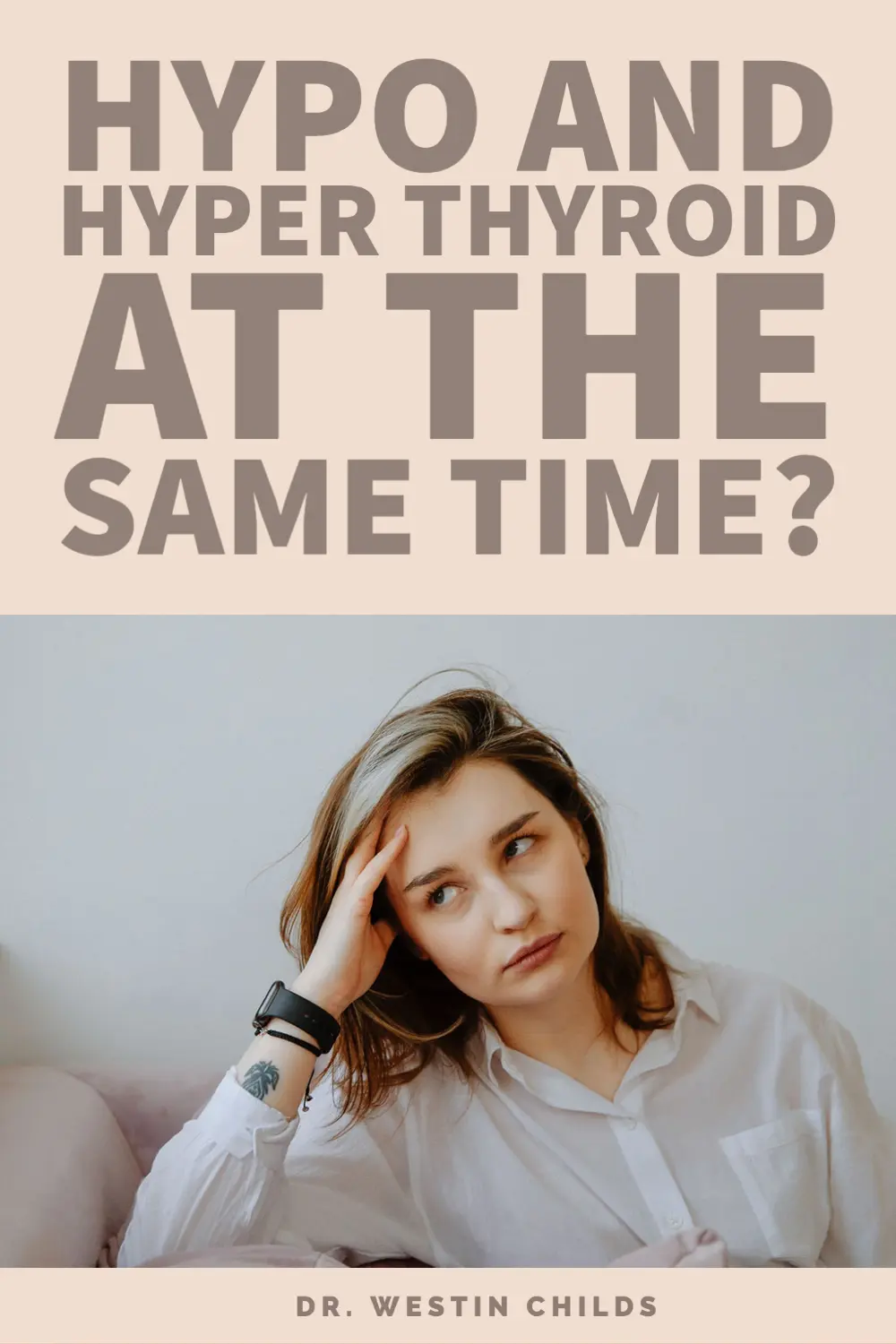
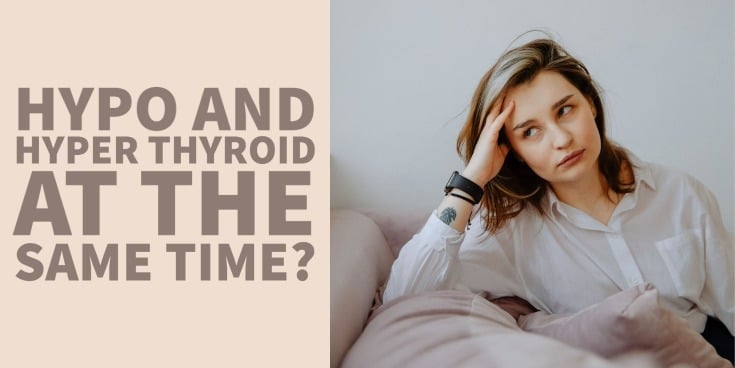

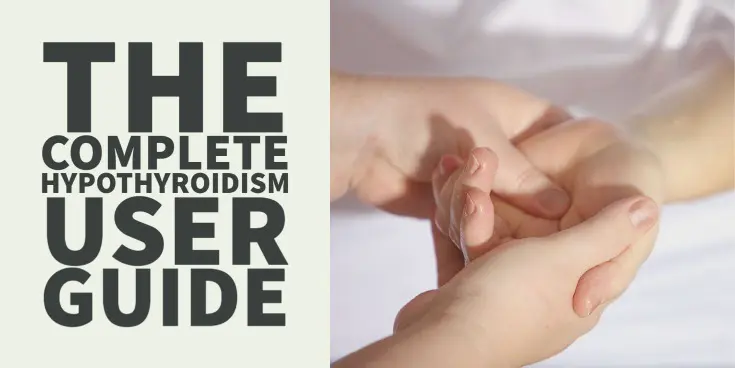
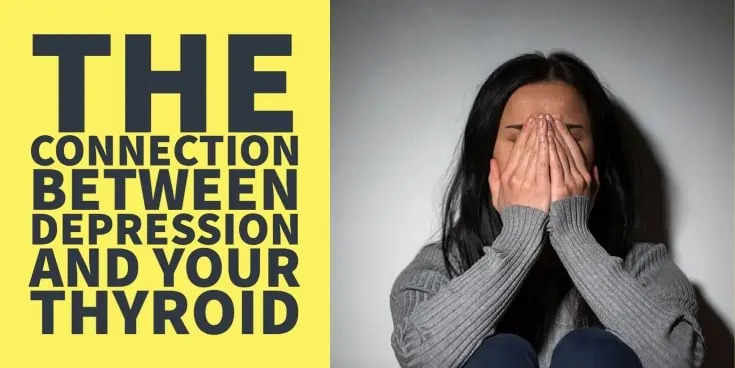
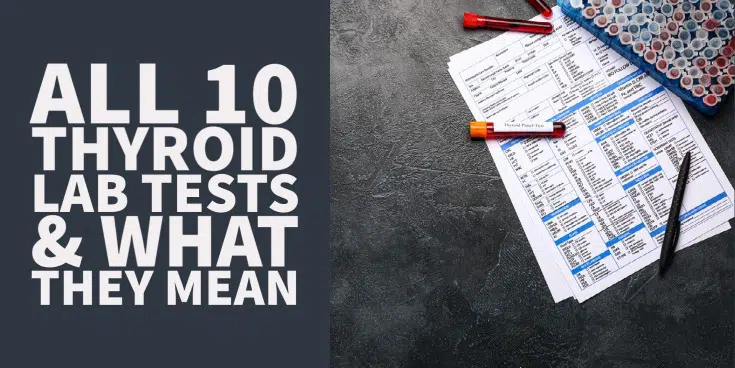
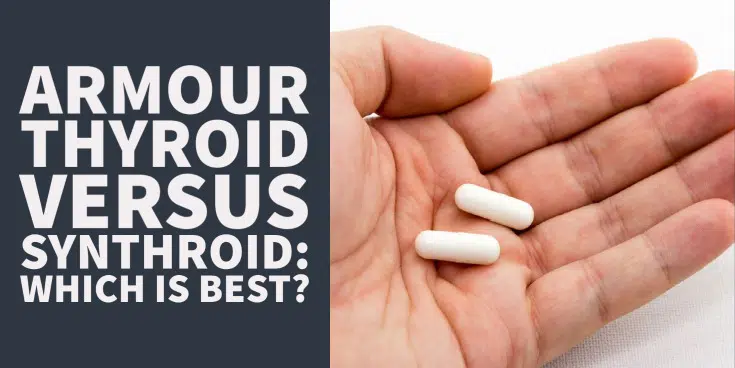
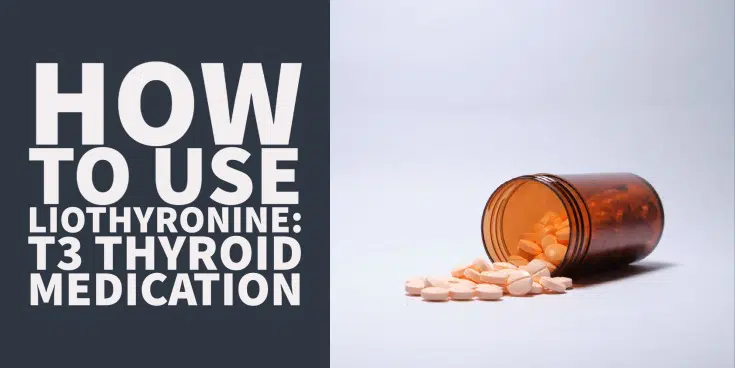


Hello Dr Child’s,
Regarding your article on too much thyroid hormone and how it can cause osteoporosis, how high would your levels need to be in order to develop this? My PCP allows my t3 levels to be at the higher end of the range…which is a blessing…most doctors want you in the middle, but could this cause osteoporosis…I have osteopenia and am only 58 yrs old. I would appreciate it you could clarify. Thank you
Hi Lori,
It really depends on the person. Some people can experience issues at relatively low T3 levels.
I wish there was a better answer! Haha. On 50mcg of liothyronine (5-7 years), I continue to gain weight and have osteoporosis at 32 years-old. And I’m a male. Complicated by hx of bulimia, but puts me in an uncomfortable position in terms of liothyronine. I’m still gaining weight but possibly suffering consequences of long-term use…I have training in FM/IM and I’m still stumped by my broken metabolism and it’s becoming increasingly frustrating.
Hi Josh,
Have you tried reverse dieting? Unfortunately, many people with severe metabolic dysfunction will require excess calories and weight gain to “fix” the problem. This is often difficult for someone who struggles with body image issues because it can trigger the type of eating that got them into that mess in the first place.
I most definitely have experienced this very thing. For me, it is because of different tissues! I can feel my thyroid medication in my heart ALMOST immediately! I tried explain this to my doctors… and they all will tell me you don’t see c benefits: from the medication for weeks. I witless tell tien…I see it within 30 minutes!! Thank you for this enlightening information!!
Hi Anja,
Happy to help!
That’s me me .
I have TT but often feel that having symptoms of both hypo and hyper .I have read most of your PDF articles very informative.I have tried a lot to convince my doc to have test about T3 and reverse t3 but my TSH level is high .so she is not convinced to .let me have that test.as usual said TSH ts the only thing to be considered.
Hi Ketki,
It’s often best to just find a new doctor if your current doctor focuses only on the TSH.
This article describes my experience for the past two years. In 2018 Naturethroid stopped working for me (and many people). Over the past 2.5 years I have been on NP, WP, compounded T3 and Levoxyl, and now (since 9/2020) on Armour. Over this period I have had ongoing heart palpitations, which seem to be worse on Armour and the synthetics. In addition, I have hair loss, fatigue, dry skin, and some depression. I also finally convinced my MD to test my adrenal function with the saliva test. My daytime cortisol was too high, out of range, and my afternoon cortisol was too low, also out of range. My doc put me on DHEA 5mg daily and licorice drops. Been taking these for 5 months.) I have also had shortness of breath that seems to be worse on Armour, but it’s been present for most of the last two years. (I have had heart tests–nothing abnormal.) I am totally at a loss…and feel defeated. Yesterday was the first day I had ZERO heart palps in almost a year. I attribute this to changing my Armour from divided doses to one total dose (45mg) in the morning. My doc has ok’d me to raise my Armour dose to 60mg in the morning, and I intend to do that in a few days. (One grain of Naturethroid taken in the morning worked great for me for years, until it changed.) Any thoughts you may have would be greatly appreciated. So, yes, definitely possible to have symptoms of hypo and hyper thyroid at the same time. Thank you.
Can the hyper and hypo last for years or months?
I am 55 and I had NEVER been tested at all, never had a blood test from any Dr all my life until I paid for one for bio identical hormones after menopause this past December. Then I found that my TSH was high and what that meant. I then learned after reading Dr. Mark Starr’s book on Hypothyroidism that Meniere’s disease is a symptom of hypothyroidism! I have been battling this since 1992! and no one looked at hormones at all. They put me on lasix and valium and told me to stop using salt. I read in 2014 that iodine and removing fluoride from your water could help Meniere’s and once I did that, over a few months, my Meniere’s went away! I no longer get dizzy and fall down or anything! I stopped going to my neurologist completely. For over 6 years now.
I had also stopped smoking at age 40 and gained a bunch of weight over the years since. I assumed this was all because I stopped smoking. But then, in 2019, I lost a bunch of weight, about 25 lbs, my hair got better, my skin got better, I felt better! I don’t know what exactly changed.
Then again, after Dec of last year, I am starting to gain the weight back and noticing some hypothyroid symptoms but didn’t even know about hypothyroid. I thought it was menopause and that maybe bio identical hormones would help as well as with hot flashes.
Now, I’ve been on a pellet for testosterone and estradiol plus a progesterone pill each night. After my first 3 months, my cholesterol is now up 100 points, my TSH went from 7 to 93 and I have worse symptoms of hypothyroid than I ever had. They also checked me for antibodies and now say I have hashimoto’s.
I’m wondering if I am swinging back and forth between hypo and hyper thyroid over months at a time and also wondering if this pellet is making my thyroid issues worse. Plus I’m getting hives when I take the NP Thyroid. I have not been able to take this NP Thyroid more than a week now before I break out so I can’t say if it makes me better or not.
I’ve asked my Dr to change the NP Thyroid to the Armour brand since I had read that the Acella brand has caused others to break out. I have always had weird allergies all my life too but not like this.
I feel like just stopping everything for a couple of months to see what my body wants to do but I don’t want to gain all the weight I just lost back. I’ve already gained more than half of it. I’d like to go back to where I was in 2019 but I don’t know what changed then…
This is all very new and confusing to me. I’ve always thought of myself as healthy and have always worked out all my life, other than the smoking.
I’ve never looked at gluten or dairy in my diet and the year I lost all the weight, I even ate out more than usual and ate more ice cream than ever 🙂
Hi Tina,
It’s possible but the best option would be to get tested to know for sure what is going on with your thyroid.
Is it possible to experience central hypothyroidism caused by some type of malfunction in the pituitary/hypothalamus region that is ”masked” and interpreted as hyperthyroidism by elevated excretions of T3 *or* T4 due to thyroid adenomas? And how dangerous could it be to get treated for the wrong issue?
Hi David,
Yes, I suppose it would be possible but could be ruled out with additional tests.
Good evening Dr. Childs. I had part of my thyroid removed several years ago because of a nodule that was suspicious. Thankfully it was benign. I have blood tests on my thyroid ever so often, but normally it is just the TSH. It always comes back within the normal range. I have recently been diagnosed with SIBO and have read that it could possibly be linked to thyroid issues. I have both the symptoms of hyperthyroid and hypothyroidism. (Hair loss, weight loss, tremors, neuralgia, dizziness, joint pain, headaches, rapid heart rate, fatigue, etc.) At first I thought it might be lingering side effects from my partial hysterectomy surgery back in October, but it hasn’t gotten any better. Which tests would be best to determine if I have either one? Thank you.
Hi Gina,
If you are asking how to differentiate between hyperthyroidism and hypothyroidism then getting a full thyroid lab panel as outlined here would be all you need: https://www.restartmed.com/normal-thyroid-levels/
My labs are all over the place. I had RAI 8/19 and since have had a lot of stress (ie suicide in family, household issues, single parent, etc). I was on synthroid 137.5 and switched to Armour 60 to get the T4 and T3 along with the fact I feel more comfortable taking a more natural medication with less fillers. I felt horrible a month after switching and asked to be bumped up because I feel I was undermedicated. My doctor did not feel comfortable but did up to 90. I slowly upped it more to 150 and was feeling great (and honestly still do besides not being able to lose weight and horrible headaches which I have had for years) but I went back down to 90 about a week and a half before new labs because I new my TSH would be low and that is all anyone ever looks at (I feel better when it is closer to 0.0 I have realized). But I just got labs back yesterday and they are actually all over the place and a bit confusing. I did have sex hormones checked at the end of March and they were normal. I take zinc, selenium, vitamin D3, B12 and calcium.
TSH .01
FT3 4.1
T3 total 1.84
TPO 2208
Cortisol 27.5
Reverse T3 11
My concern is I have a pituitary or adrenal gland issue. With my numbers the way they are above would I be in line to ask to have those things checked? I apologize for the long message I am just so confused because my doctor wants to lower me back down to 60 of Armour and I am scared because I almost didn’t make it out of January. I was very depressed and in horrible pain with my quality of life in shambles.
thank you
Marissa
Yes it seems I have both! It’s like my thyroid corrects itself. I can gain or lose 20 lbs quickly. I take no medicine. By the time my primary Dr refers me to endo Dr my numbers are back in “correct range”. I also have a goiter for the past 30 years. Right now I’m going for more testing at endo Dr for being extremely hot, even though my hormone levels are where they should be according to my obgyn. I am 57 years old
Hi Delia,
Many doctors will tell patients that they are “normal” when that isn’t exactly true. I would recommend reading this article: https://www.restartmed.com/normal-thyroid-levels/
Hi Dr Child,
Thank you for all your information it’s very helpful. I have a question and comment. I have been dealing with thyroid issues for a long time and have been on all sorts of medicines. I had high reverse t3 last winter and it made me severely hypothyroid despite labs looking “normal”. I was on 3 grain of armour thyroid and my free t3 would never budge above 3.5 while on it but I still felt hypothyroid. I believe it was the extra t4 causing my reverse t3 so I went down to 1 grain of armour and slowly increased t3 Medication until I was taking 50mcg t3 plus 1 grain armour. My free t4 is now up around 4 and my free t4 is very low. Tsh is suppressed. I also resolved my high reverse t3. I know I am experiencing the hypo/hyper phenomenon especially with the t3 my heart rate gets very high. So my question is how to remedy this if you need the t3 but yet it’s over stimulating to the heart and the extra t4 converts to reverse t3. I have trouble with my weight so I know my thyroid is not hyper in that department. My doctor put me on 45mcg t4 with 20 mcg t3 compounded plus the t3 in divided doses. Any thoughts?
Also I have read that some of the hyper symptoms can actually related to adrenal dysfunction and also adrenaline being stimulated. Can you speak to that? Thanks!
Sara
Hi Sara,
Some people believe that taking thyroid medication or thyroid supplements can stimulate adrenal function and lead to hyperthyroidism. I haven’t really found this idea to be true, at least not in my experience.
For me, it’s seasonal (that’s my impression; I’m not on prescription medication and don’t get tested). In summer I lose weight (5 to 10 lbs., effortlessly), grow long fingernails, have insomnia, lose some hair, and can get irritable at times. In winter that goes away, and I’m mindful about putting on weight. None of this seems serious in that I have nothing like heart palpitations or brain fog (whatever that is). So I just adjust my supplements somewhat with the season.
Hi Miriam,
That seems like a very reasonable approach!
You said: if you take the oral thyroid meds. Is there another way to take the thyroid meds ?
Hi Eliza,
Yes, you can take thyroid injections or you can use them sublingually:
https://www.restartmed.com/levothyroxine-injections/
https://www.restartmed.com/thyroid-medication-sublingually/
I am so confused. My antibody tests first were positive for graves. I took methimazole for 2 yrs. Now I have antibodies for hashimotos and am on armour. How can I have antibodies for both?
Hi Sharon,
Yes, you can definitely have antibodies for both but if you are taking thyroid medication then the hypothyroid or Hashimoto’s condition is the one in control.
Since a very young age I was always skinny, had a huge amount of migraines and depression. I was diagnosed hypothyroid in 1996 and put onto thyroxine 75 μg which was augmented to 100 μg in 2003. The migraines went away after the augmentation of thyroxine also most of the depressions. In winter the dose was again increased to 125 μg for a short time. Since I take thyroxine now under the tongue I feel a lot better and reduced the dose. Unlike most hypothyroid people I am skinny and nervous. Since I have changed the way I take the meds I am a lot better tolerating cold.
Hi Katie,
Thanks for sharing! Sometimes making small changes like how or when you take your thyroid medication can have a huge impact on how you feel.
I’ve been diagnosed with hyperparathyroidism. Where does that put me especially in what meds to take?
Hi Nancy,
Hyperparathyroidism is completely different from hyperthyroidism and hypothyroidism. In most cases, you won’t need to take thyroid medication unless you ALSO have a thyroid gland problem.
I feel like everything that is going on with my body, constantly, is related to my thyroid medication. I had a partial thyroidectomy 50 years ago; had the balance removed about 25 years ago. My medication and labs seem to fluctuate a lot. My liver enzymes get elevated and I am constantly tired. I have both hypo and hyper symptoms and they vary from day to day. I feel like an insane person and cannot find a doctor that “gets it”. HELP.
Hi Patti,
Please see this article which can help you find someone: https://www.restartmed.com/how-to-find-a-doctor-to-treat-your-thyroid/
Hi Dr. Childs,
If I think that my symptoms are likely because some of my tissues are being overstimulated by thyroid hormone (or thyroid medication) and other tissues are being understimulated, is there then anything that can be done to resolve this?
Hi Jessie,
Yes, you can change how you take your thyroid medication and what type of medication you take. You may need to multi dose throughout the day or switch to something like SR T3: https://www.restartmed.com/sustained-release-t3/
Dr. Childs: Is it possible to feel alternating between hypothyroid and hyperthyroid after having a thyroidectomy ? I am on Synthroid (75mcg) supplementing with liothyronine ( 5mcg.) My TSH is 0.57, FT3 is 3.20, FT4 is 1.19. I would like to increase FT3 to low optimal 3.8 to eliminate fatigue and constipation. Would that help? Thanks for all your help.
Hi John,
Yes, it’s certainly possible.
Hi Dr. Childs, thank for all you do to help us with thyroid issues. As far as hypo and hyperthyroidism Merry go round, you have described me. I do have hashimotos for sure. I have written to you before. I have lupus, and I’m gonna lose my mind. When I have thyroiditis attacks, I’m useless. Hubby had leukemia that is gone but can’t keep his hgb ^. I am 64 and disabled RN. I’m only on levo 75mcgs, tsh is high.. 88 mcgs is too much for my heart receptors, and after I read your article I saw myself. I just went thru a week of hell with thyroiditis. Lost 8lbs in 4 days! This happens in cycles. I wanted to try 2 of your items in the hashi bundle. Can these help me balance out my body? Can’t takes the palps and sweats anymore. Think it’s time to take over my care. No one seems to know what to do with me. Also Happy New Year, you’re the best person I have ever understood. Thanks, Lucy
Hi Lucyann,
The supplements in the Hashimoto’s bundle are designed to help cool down the immune system while also supporting thyroid function. If your primary focus is reducing inflammation then Omega Soothe SR and Functional Fuel DETOX would be the best for that 🙂
Hello, I am definitely going back and forth from hyperthyroid and hypothyroidism. I’m not on any thyroid medication. What can I do to help level out my symptoms? I have been diagnosed with fibromyalgia I’m 54 years old and have had 8 blood tests within a year come back as low thyroid. But my t3 and t4 are within normal range. My doctor has told me that my tests results are not low enough to worry about. But I have constant symptoms, loss of hair, itchy scalp with flakes, headaches, contact dermatitis, heart palpitations, no energy, waking up every 2-3 hours, body pain everywhere, heat rashes from over heating constant hot flashes, that come and go, even from eating certain foods, digestive problems, ibs. I could go on and on…. But I think you get the idea.
Thank you Victoria
Hi Victoria,
The best thing you can do is try to figure out what is causing the swings and then target that. Potential causes include stress, infections, illness, and environmental toxins.
I am definitely suffering with both hypo and hyper it seems. I am on 100mcg Levothyroxine and 15 mcg liothyronine.
I find it impossible to control my body temperature, I am often too hot. I have hair loss, tiredness, insomnia, low mood, brittle nails and plenty more etc..(my thumb nail changed shape and has become quite flat) but I can swing quite quickly from one thing to another.
I started T3 in May 2021, the T3 has help hugely with my digestive problems, and at the start with sleep but my TSH is suppressed (0.01), so it was suggested I was over medicated. (FT3 5.72 (3.1-6.8) and FT4 14.6 (12-22))
I have hot flushes on waking and and going to bed but not in the night, is this cortisol problem? Or is it all post menopausal symptoms? I have been postmenopausal for 8 years now I was expecting all this to disappear. I have been working on my thyroid meds but now think that may be I need to look at HRT? who can I unpick all of this and find the solution . I’m in the UK T3 is not encouraged as it it too expensive! they say. Finding help here is very very difficult.
Hi Deenie,
Most of the time, hot flashes are secondary to the menopause transition. It’s possible, though, that other conditions may contribute such as the thyroid. I know it’s possible to get T3 in the UK but I’m not 100% sure how people are getting it.
“Skin Tissue – This type of acne is often related to the thyroid and can be very hard to treat unless the right dose of thyroid medication”
its crucial to supplement B-Vitamins – methylated works best from my point of view. Only the B’s helped me out of this rabbit hole!
It might sense to have a closer look on eNOs, the wrong one – iNOS is mostly elevated and drives inflammation.
Hi Andreas,
I agree. All of my supplements that come with B vitamins come in their pre-methylated and pre-activated forms. I have also found that thyroid patients do better with these formulations of B vitamins.
Great article, thank you, Dr. Childs. I can’t believe I never thought to research that I may have on again, off again, hyperthyroidism and hypothyroidism. Every doctor I saw over the years told me my test levels go up and down but it’s not enough to worry about. Only when I saw a nutritionist who asked me my symptoms and listened to my concerns was I told I had hypothyroidism. He prescribed me the lowest dose of Armour Thyroid and wow did I feel like a new person. Of course, he moved out of state within a year, and for the last 18 years, I have suffered without the medication. (I will not take man-made medications)
My symptoms are low energy, hair loss, dry skin, excessive sweating, unregulated temperature (never comfortable, either hot or cold), lower temperature, foggy brain, tired after any activity, carrying more weight, irregular periods, joint pain, easy bruising, and muscle weakness. I’m sure there are more but those are the main symptoms. I started taking selenium but I thought it made my hair fall out more. I also take iodine, D3, C, Zinc, Turmeric, B-Complex, Quercetin, Magnesium, and multi-collagen. So far I don’t think I have seen any relief. PS, I also cut out sugar and processed carbs 6 years ago.
Hi Jacque,
That sounds like a good regimen! It would probably be a good idea to retest your levels to see if your symptoms are related to your thyroid or not: https://www.restartmed.com/normal-thyroid-levels/
Hello
I dont even know were to start, I am really having a hard time, nobody has been able to help me.
I am so sad you are not accepting new patients.
I have no idea what to do anymore.
I was diagnosed over 8 year with Hypothyroid. My Thyroid ranges from 3.0-5.5, not that high but I am sensitive and have symptoms of exhaustion all the time, depression, muscle pain, hair loss, my blood pressure is sometimes 84/42 and more.
8 yrs ago I took Levothyroxine or Synthroid I forget which one for 6 months and I felt amazing but unfortunately my hair was falling out really bad and I got scared and stopped and did not restart Thyroid meds tell 8 mnths ago. I am extremely sensitive to medicine maybe it is because of one of the situations you mentioned above. I started at lowest dosage because of sensitivity and the started with meds that had least fillers.
On all meds I felt worse than before I started taking them I was more exhausted, could not sleep was up every hour, felt on edge. It was awful.
tried to start with T4 only to see if it would convert, then if did not work was going to try the T3/T4 combo. nothing worked and now my hair is falling out I have bald spots everywhere. 🙁
My hair was a huge concern, It did not fall out on any of these meds , it actually improved when taking the T3/T4, then I took the Synthroid brand and it fell out in huge clumps so stoped taking all togather, its been 2 months and it is still falling out really bad.
meds I took:
1. Tirosint lowest dosage it came in for 1 mnth, my TSH went from down to 2.89 from 5.5 but again felt worse than before I took it, I stopped could not handle the way it made me feel, No hair loss.
2. Compound Levothoroxine 0.05 1 month 3/17/22-4/17/22 TSH went up to 5.22 same felt awful, No hair loss
3. Armour Thyroid lowest dosage it came in from 04/19/22-06/12/22 TSH went down to 3.49. same felt awful, No hair loss
no meds for a week then started Synthroid. No hair loss yet.
4. Synthroid .25 felt really bad, Hair fell out less than a week after taking so discontinued and have not got back on anything, it has been 2 months and I am so scarred because my hair is still falling out really bad, it was not doing this on any meds except Synthroid and was not falling out like this before I started the meds. I think maybe the T3 direct Thyroid was helping my hair and maybe what I need but dont know what to do because I feel bad on everything I take. worse than before the meds. I might have the situation that you were speaking above I dont know what to do I will not look good bald 🙁
any suggestions?
Sorry about the long message I am just so tired and also loosing hair making me very sad
Hi Jeanine,
Please see these articles which contain information designed to help you figure out the root cause of your hair loss and provide you with some treatment options:
https://www.restartmed.com/thyroid-hair-loss/
https://www.restartmed.com/treatments-for-thyroid-hair-loss/
I have been experiencing both hyper and hypo symptoms for several years before and during medication for thyroid. I was officially diagnosed with Hashimotos after I had twins for my first pregnancy. I was trying to get help with symptoms before marriage and children but nothing substantial showed on blood tests until my first pregnancy. I have always been plagued by bad dreams and restless sleep, and do not remember a time when I did not sleep in when I could because I only remember being tired all the time. When I went through puberty I had significant brain fog and I experienced slow and uncomplete development regarding menstrual cycle and breast growth. I didn’t start my period until I was 17 and I only grew one breast that was maybe an size B and the other a tiny A with little density in both. When I had babies I did not produce more than 1 oz every 5 hours from one breast and only a few drops from the other. I consider this to be abnormal and a result of messed up hormones. Fast forward to today, my main complaint is fatigue, brain fog, anxiety day and night dreams, as well as occasional heart palpitations and hair loss. I began taking Armor Thyroid but after a few years of frustration with fluctuating symptoms I am now trying to find the right dose of synthroid. When I take medication I instantly see a result in my mental clarity and management of anxiety filled day and night dreams, but I still gain weight, feel tired, loose hair, have dry skin, have heart palpitations. My doctor is giving me a lower and lower dose because blood work is showing that my TSH is super low.
Very frustrated. I was on Armour Thyroid 120. My TSH was very low. .01 my free T3 was 5.8. , my t4 was 2.1. My Dr decreased to 90 and back to all the hypo symptoms. Constipation, dry skin, hair falling out, brittle nails. exhausted. My labs were still low TSH.01 but Rt3 was 2.3. T4 1.2. Maybe I need to do 100 but they don’t make that. Lol.
Hi Crystal,
You can basically compound any dose of T4 and T3 using a compounding pharmacy. One downside to all formulations of NDT is that their T4/T3 ratio are static and not dynamic like compounded T4/T3 medications: https://www.restartmed.com/compounded-thyroid-medication/
Four of us in my family are needing thyroid supplementation. Our symptoms and treatments vary but we are learning from each other. My wife has a symptom where parts of her body twitches, jumps or is spastic-like when she is about to fall asleep and it prevents her from sleeping. It occurs over and over. Often it resolves by taking T4 meds, but not always, and sometimes taking T4 it raises her heart rate so much that her heart rate then keeps her awake, not the muscle twitching. (1) What are all the reasons she could be twitching and what can she do to resolve the twitching? (She’s had series of weeks where she might only sleep 0-2 hours a night and she is now experiencing great fear and trauma from chronic sleeplessness.) We can’t always read the symptoms to tell if she is hypo or hyper in T4 or in T3 or in given tissues. (2) Are there more resources out there we could get to help us discern when she might need a little more/less of either T4 or T3? (3) Is there a resource indicating all other compounds in our diet/supplements that affect ones thyroid levels such as fulvic acid, iron, thyroid calming, etc.? And (4) is there a place we can go to learn about the effects and symptoms of T1 and T2 (and even Reverse T3) when one’s body is hypo thyroid and what can be done about it? Your insights are super appreciated!!!
Hi Jim,
I would look into restless leg syndrome and magnesium deficiency as potential causes for her twitching if you haven’t already.
In regards to your other questions, the majority have been answered in various blog posts on my website. I have over 500+ articles and resources that you can search through as needed.
What treatment would you advise someone with Thyroid peroxidase of 60, it looks like i have Hashimotos.. but i have both high TSH and T4…
High TSH of 12, mu/L
AND High Free Thyroxine of 23.3 pmol/L
Can Levothyroxine still be used?
Hi Geraint,
Levothyroxine could definitely be used but I would also try natural therapies simultaneously. This tends to improve outcomes and symptomatic management. You can learn more about the basics here: https://www.restartmed.com/natural-thyroid-remedies/
Can tissue sensitivity occur with anti-thyroid medication (i.e. Methimazole), as well?
Hi Z,
Are you referring to thyroid resistance? If so, yes, methimazole would increase thyroid hormone cellular resistance.
I took a long list of both hypo and hyper symptoms to my GP and she sent me to a psychiatrist because she said i was making up symptoms (since its impossible to have both sets symptoms at the same time). The psychiatrist told me he though I needed better doctors.
It turns out I had a brain tumor which not only cut off my thyroid hormone but also my cortisol. And if you have both low thyroid and low cortisol you can get both sets of symptoms at the same time. My main symptoms where weight gain, fatigue, heart palpitations, very fast heart beat (120 bpm lying in bed), severe night sweats, sweaty hands, lack of concentration and memory and bowl problems.
When I started taking synthroid and hydrocortisone most of the symptoms disappeared. Of course it took 10 years to get everything resolved.
Sorry to hear about your tumor, Don! Thank you for posting. What a horrible ordeal! I hope things are going well for you know.
In May my T4 was .47 and TSH was 25.4! I started taking 50mg levothyroxin and my current test shows T4 1.94 and TSH 0.015. My doc said to cut the levo to 25mg for 2 months and then test again.
I have a history of going between hypo and hyper thyroidism. My concern is that my TSH is so low and she still wants me to continue with the meds. What do you think?
Can a non-cancerous nodule on your thyroid cause you to have symptoms of hyper and thypothroidism?
Hi Callie,
Yes, but it’s very uncommon. Most of the time, nodules do not impact thyroid function.
Mid-June, my dear wife developed an abscess tooth followed by a root canal. Around this same time she started to feel internal heat (beyond her hot flashes). For the last 5 weeks it has grown to be extreme internal heat 24/7. (Neither one of us got the Covid shot.) She is very sleep deprived which dramatically affects her energy, cognitive ability, feels nauseated, etc. Under Dr supervision, we’ve had many blood tests resulting in adding supplements and lastly estrogen and progesterone cream. Nothing has helped so far. She has Hashimoto’s and has been treated with T4 and T3 for years. No one seems to know what to do. She doesn’t know if she can hold on much longer. Any counsel you care to offer would be much appreciated! We are desperate for direction! Blessings, Dave
My tsh was high but my ft3 was also high and my ft4 was in range. How can that be?
Hi Bjorn,
It’s hard to say for sure without more information, but the pattern you’ve mentioned here isn’t that uncommon. It’s also one of the reasons you need your symptoms to get clarity on what’s happening in your body.